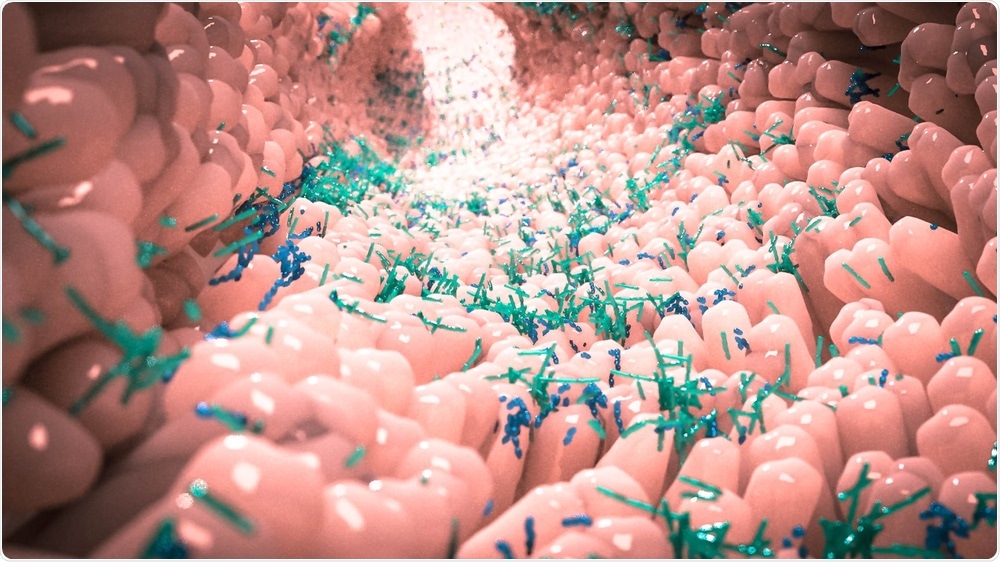According to a new study, the gut microbiota in human beings mostly evolves into an adult-like composition five years after birth, but significant differences continue to persist. The study was published in the Cell Host & Microbe journal on March 31st, 2021.

Gut Microbiome. Image Credit: Alpha Tauri 3D Graphics/Shutterstock.com
Many bacterial taxa linked to human health are acquired late in childhood and do not reach their adult-like composition by five years of age.
We hope to highlight that the gut microbiota continues to develop during childhood. Our findings underscore the possibility that the microbiota may be particularly sensitive to disturbances during this early establishment, which may have profound effects on health later in life.”
Fredrik Bäckhed, Study Senior Author, University of Gothenburg
Newborns generally acquire bacteria via transmission from the environment and the mother at the time of delivery. Within the gut microbiota, the ecological succession becomes a dynamic process during infancy and later stabilizes during childhood.
Prior research works have indicated that the microbiota starts to stabilize and reaches an adult-like composition two to three years post-birth. However, the mechanism through which the gut microbiota develops post infancy is yet to be clearly defined. More specifically, the succession through which different kinds of bacteria are embedded into the gut microbiota continued to be vague.
There has been a lot of focus on the gut microbiome in infancy, which is a very important period of development for both the gut microbiome and other physiological and biological processes. However, much less is known about the continuing development of the gut microbiome after the first few years.”
Josefine Roswall, Study Co-First Author, Hallands Hospital Halmstad
To close this knowledge gap, the investigators studied the microbiota of 471 Swedish children, tracking them from birth to five years of age. Through 16S rRNA gene sequencing, the researchers profiled the microbes found in fecal specimens obtained at four months, one year, three years, and five years following birth. The team also compared the children’s microbiota with those of their mothers and an adult Swedish group.
The researchers observed that the biggest changes in microbiota composition took place between 4 and 12 months of age. Microorganisms, which are common in adults, began to appear when the kids started to consume solid food.
Over a period of five years, different microbial genera followed four major colonization trajectories, growing in abundance and stabilizing at different points of time following birth. Interestingly, the microbiota of an insignificant number of five-year-old kids was found to be mature for their age, while a few adults had less mature microbiota than predicted for their age.
We find that many of the genera of bacteria which dominate the adult gut microbiota are established at three years. However, we identify several less abundant bacterial and archaeal genera that are still increasing up to five years of age.”
Lisa Olsson, Study Co-First Author, University of Gothenburg
For instance, five-year-old children lacked the adult-level abundance of the microbial community, the bacterial family Christensenellaceae, and also the bacterial genus Methanobrevibacter. On the other hand, adults had a lower abundance of the bacterial species Ruminococcus gnavus when compared to five-year-old children.
High proportions of R. gnavus combined with low community richness have been repeatedly associated with various diseases, like inflammatory bowel disease, metabolic syndrome, cardiovascular disease, and obesity. On the other hand, certain members of Christensenellaceae and a high abundance of Methanobrevibacter have been associated with metabolic health.
Furthermore, kids with lower weight gain than predicted between 1 year and five years were found to have a more immature gut microbiota at 12 months of age. Analogous to malnourished kids, the Swedish kids with lower weight gain had decreased abundance of Faecalibacterium, which has been associated with metabolic health.
In line with the previous outcomes, the researchers found that the mode of birth had a major impact on the gut microbiota early in life. In particular, cesarean section was linked to lower diversity of microbes at four months, but as the gut microbiota progressed to mature, this became normal at three years.
Besides this, 25 genera also demonstrated a different abundance of bacteria in five-year-old children born with cesarean section when compared to those born vaginally.
The researchers added that the new study serves as a reference for the usual development and establishment of the gut microbiota in early childhood.
“Although our data is insufficient to make claims about future metabolic conditions, experimental studies have demonstrated that, if the microbiota is disrupted by antibiotics before weaning, mice develop obesity later in life. Future, larger studies are required to identify potential time windows when the gut microbiota may be particularly important for the development of diseases in humans,” concluded Bäckhed.
Source:
Journal reference:
Roswall1, J., et al. (2021) Developmental trajectory of the healthy human gut microbiota during the first 5 years of life. Cell Host & Microbe. doi.org/10.1016/j.chom.2021.02.021.